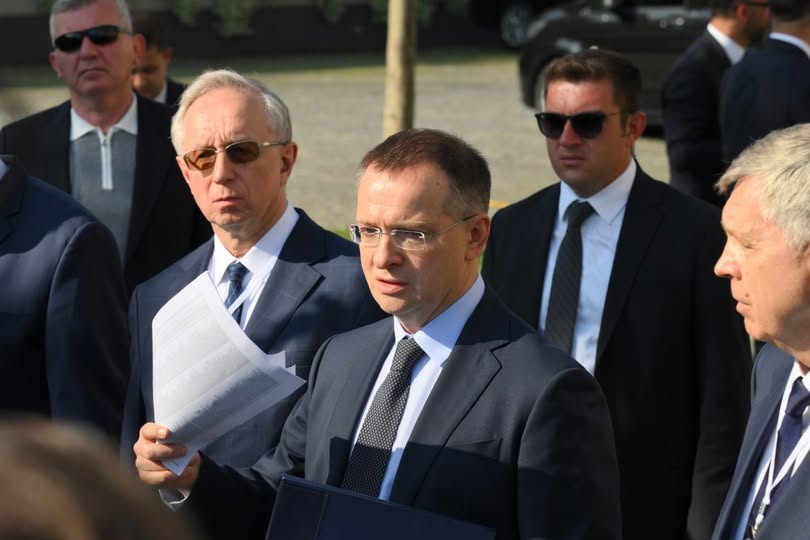Från Ryska Utrikesdepartementet
2025-06-05

Russian Foreign Ministry - МИД России
·
 Excerpt from the report by the Head of the Russian Federation’s Delegation to the Russia–Ukraine direct talks, Aide to the President of the Russian Federation, Vladimir Medinsky, at a meeting between President of Russia Vladimir Putin with members of the Government (June 4, 2025)
Excerpt from the report by the Head of the Russian Federation’s Delegation to the Russia–Ukraine direct talks, Aide to the President of the Russian Federation, Vladimir Medinsky, at a meeting between President of Russia Vladimir Putin with members of the Government (June 4, 2025) Vladimir Medinsky: Mr. President, colleagues,
Vladimir Medinsky: Mr. President, colleagues,The bilateral talks in Istanbul began with a restricted-format meeting that lasted more than three hours, followed by an expanded discussion, which included members of the delegations. The discussion was in Russian.
We presented the other side with our two-part draft memorandum on a peaceful settlement.
The first part contained terms for a long-term peace agreement.
The second part outlined the terms of the ceasefire.
The memorandum is guided by the basic principles that you formulated at the Foreign Ministry last June. The Ukrainian side promised to study it and give its comments later.
In general, during the talks, they reaffirmed their proposals, which basically include two main points. First, they want to begin with a 30- or 60-day unconditional ceasefire. Second, this ceasefire period is to be used to prepare for a summit meeting of the two heads of state. They set it all out in their version of the memorandum, which was handed over to us on May 28.
Humanitarian issues were also discussed on the sidelines. We emphasised the need to focus on working out the terms of peace rather than another temporary truce, and conveyed your opinion that a meeting at the level of heads of state is possible, but it needs to be substantively prepared to achieve results. The heads of state should approve agreements, not spend time working out the details. It is up to them to make final decisions on the drafts that have been fully prepared and coordinated.
When it comes to humanitarian issues, we agreed on the following.
First. Conduct an equal prisoner of war exchange, at least 1'000 people from each side, primarily from among those wounded, severely ill and below the age of 25. The final numbers of this equal exchange are being approved. We expect approximately 1'200 people from each side. It will be the biggest POW swap on record. We are ready to begin on June 7–9. We are fully prepared.
Second. Establish a communication line to promptly resolve urgent issues of immediate transfers of gravely wounded prisoners of war outside the framework of general exchanges.
Third. We proposed, unilaterally, to transfer to Kiev over 6'000 bodies of Ukrainian troops. <...> We are ready to begin shortly. We understand Ukraine may have bodies of our troops as well although in much smaller numbers. But we are prepared to receive any remains, if there are any.
Next. We have proposed arranging humanitarian pauses in certain sectors of the front, two or three days at a time, to collect remains, because it is impossible to do so under fire, for security reasons. Initially, they upheld our proposal and took it in, but literally two hours later, Zelensky publicly declined this potential agreement. Nevertheless, we are ready to revisit it.
Finally, the Ukrainian side handed over to us the list of 339 children allegedly kidnapped from the territory of Ukraine. Here is the list in question. We are working on it, through the office of the Commissioner for Children’s Rights. We will investigate every name.
But I must note that, for propaganda purposes, they earlier claimed that tens and hundreds of thousands of children had been brought over here. In fact, the actual number is 339 and we still need to check how many are in Russia, evacuated by our soldiers from under fire, and how many will eventually turn up in Europe, as experience shows.
Mr. President, to conclude, we have established an effective communication channel on humanitarian issues. For other matters, the ball is in their court.
https://vk.cc/cMyQ9I
Visa ditt stöd till det informationsarbete Carl genomför
Patreon
Swish

Scanna QR eller skicka till 076-118 25 68. Mottagare är Caroline Norberg.
